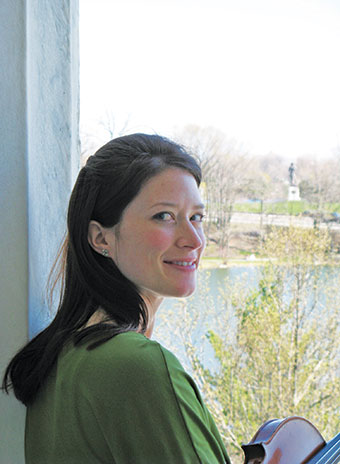Next story: Round 4, Week 1: Essential Vitamins Crew vs. A Little More
La Belle Epoque, Musically Speaking
by Jan Jezioro

BPO violinist Loren Silvertrust makes her Friends of Vienna debut
La Belle Époque is usually thought of, in the history of France, as the period extending from the aftermath of the violent overthrow of the Paris Commune in 1871 to the 1914 outbreak of World War I. But, more generally, since World War I is the defining event in the 20th-century history of European civilization, the artistic achievements of that era continue to have a resounding effect on contemporary culture. BPO violinist Loren Silvertrust, and her accompanist, the superbly versatile Eastman School of Music pianist Alison d’Amato, have selected a program for their Friends of Vienna recital on Sunday, April 28 at 3:30pm at the Unity Church on Delaware Avenue in Buffalo that includes French, German, Russian, and American examples of works from that now fabled, transitional era.
The Buffalo Philharmonic Orchestra is one of the area’s most treasured cultural institutions, and with good reason, as under the leadership of its current music director JoAnn Falletta it has continued to ascend, both in the national and in the contemporary international classical music zeitgeist, particularly through many, multiple Grammy award-winning recordings, issued on the Naxos record label, the best-selling classical music label on the planet. While the BPO enjoys the benefit of the wealth of musical knowledge generated by many longstanding members, such as principal clarinetist John Fullam, the orchestra has continued to grow by adding the best available up and coming new musicians, exemplified by the vibrant young violinist Loren Silvertrust, who joined the orchestra in 2010.
Chicago native Loren Silvertrust began violin lessons at the age of four, and she studied at Williams College, including time in Toulouse, France. Silvertrust went on to attend Indiana University’s prestigious Jacobs School of Music, where she performed as a member of the Kuttner String Quartet-in-Residence, earning both a master of music degree and a performance degree, before playing for three years in Michael Tilson Thomas’s New World Symphony in Miami. In the summers, Silvertrust performs with the American Spoleto Festival, the Boulder-based Colorado Music Festival, and the Breckenridge Music Festival, where she is currently the assistant concertmaster. Since her BPO appointment, Silvertrust has been an active chamber music participant, enjoying solo and chamber performances with the Camerata di Sant’Antonio Chamber Orchestra, the Ars Nova Chamber Musicians and the Buffalo Chamber Players.
Silvertrust and d’Amato will perform Brahms’s Violin Sonata No. 2 in A major, Op. 100, Debussy’s final composition, his 1917 Violin Sonata in G minor, and Tchaikovsky’s popular Valse-Scherzo in C major, Op. 34, while d’Amato will offer a rare contemporary performance of American composer’s Edward MacDowell folksong influenced 1902 suite for solo piano, Fireside Tales, Op. 61.
“I have not performed any of these works previously,” says Silvertrust, “which is part of the reason I wanted to do them all. I did work on the Brahms sonata one summer a long time ago while I was attending Music Academy of the West, but I never performed it publically. I’d say the Brahms is definitely a favorite, as I especially love the opening theme to the last movement. It’s the happiest of the Brahms sonatas, I think it just radiates warmth and contentment, it feels very satisfying to play it with the piano. Sometimes I play the opening theme to the last movement when I’m trying out bows or violins because it’s a good way to feel out the tone possibilities of the G string…it goes way up the G string. But also I guess because it’s always in the back of my mind as a great melody that I love to play.
“While I’m no expert on La Belle Époque, I do think that it was an especially rich time for classical music,” she continues. “Composers were getting creative with texture, orchestration, new sonorities, and were beginning to reach outside the box of ‘romantic’ but at the same time, most things are still full of melody, great passage work, and are invitingly accessible.”
Tickets are $10, $6 for students. For more information, visit www.friendsofvienna.org.
blog comments powered by Disqus|
Issue Navigation> Issue Index > v12n17 (Week of Thursday, April 25) > La Belle Epoque, Musically Speaking This Week's Issue • Artvoice Daily • Artvoice TV • Events Calendar • Classifieds |









 Current Issue
Current Issue